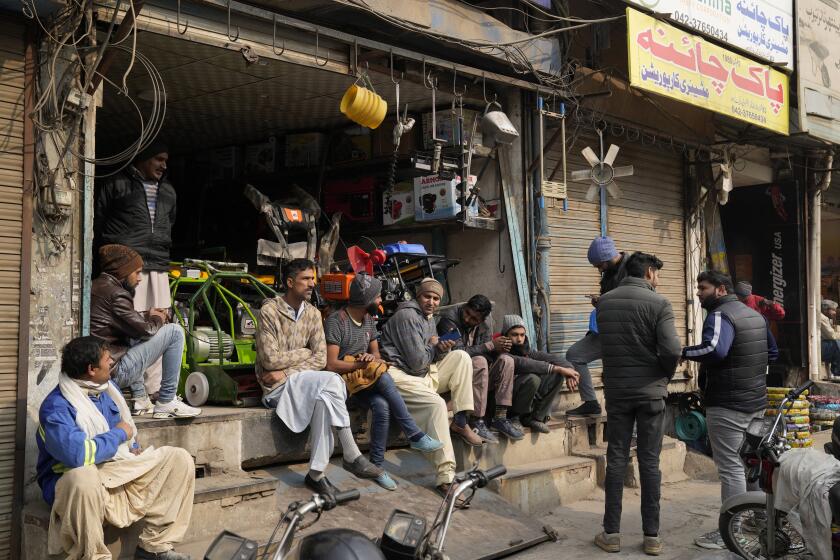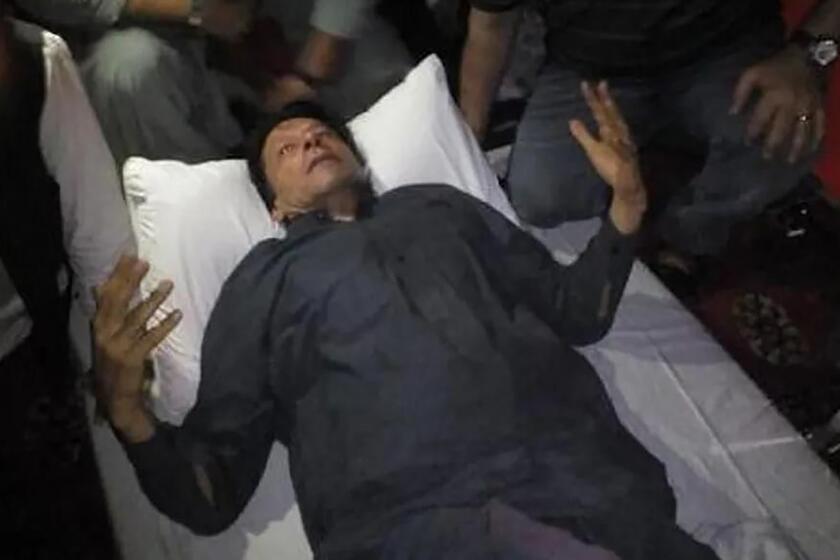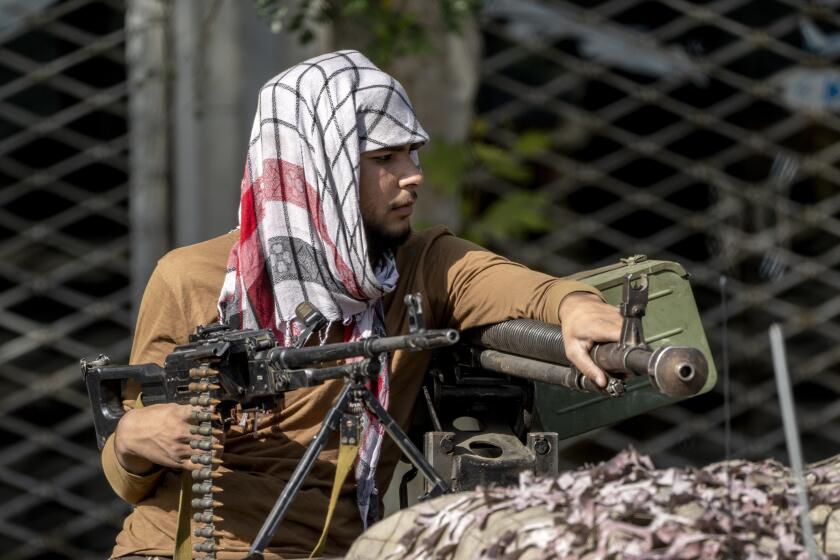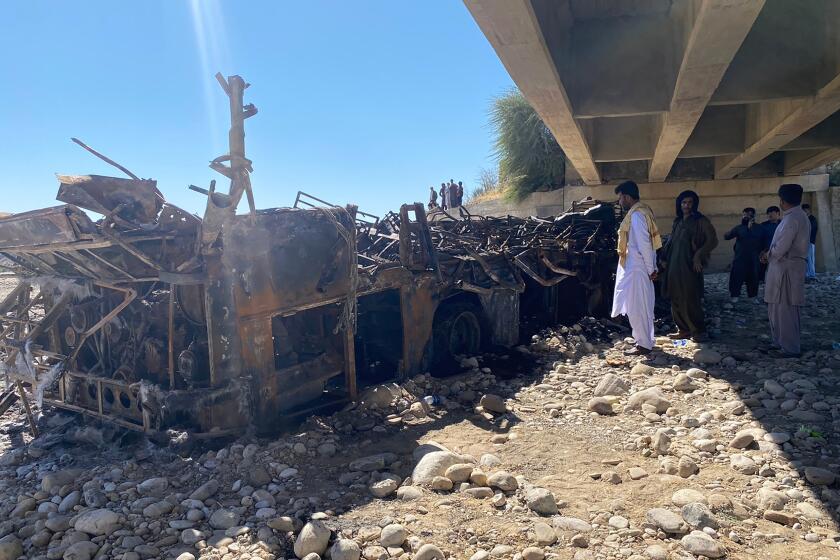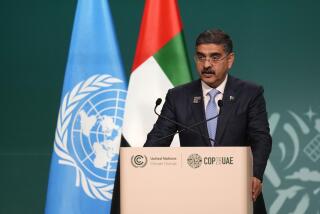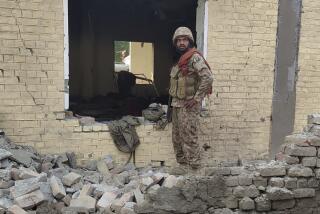Death toll rises to 100 in Pakistan suicide bombing blamed on ‘security lapse’
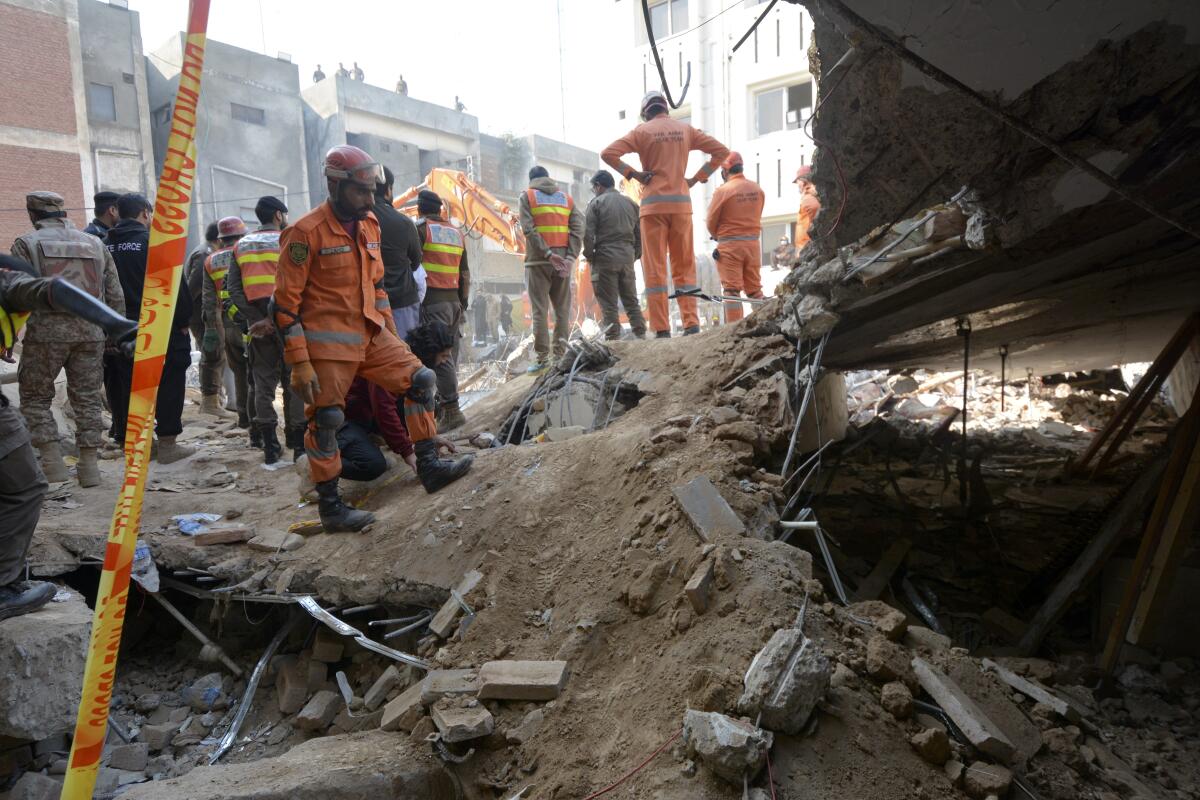
- Share via
PESHAWAR, Pakistan — A suicide bombing that struck inside a mosque at a police and government compound in northwest Pakistan reflects “security lapses,” current and former officials said, as the death toll from the devastating blast climbed to 100 on Tuesday.
The blast, which ripped through a Sunni mosque inside a major police facility in the city of Peshawar, was one of the deadliest attacks on Pakistani security forces in recent years. It left as many as 225 wounded, some still hospitalized in serious condition, according to Kashif Aftab Abbasi, a senior officer in the city of Peshawar.
More than 300 worshipers were praying in the mosque in the city of Peshawar, with more devotees approaching, when the bomber set off his explosives vest Monday morning, officials said.
The blast blew off part of the roof, and what was left soon caved in, injuring many more people, according to Zafar Khan, a police officer. Rescuers had to remove mounds of debris to reach worshipers still trapped under the rubble.
More bodies were retrieved overnight and early Tuesday, according to Mohammad Asim, a government hospital spokesman in Peshawar, and several of those critically injured died. “Most of them were policemen,” Asim said of the victims. The bombing also wounded more than 150 people.
Bilal Faizi, the chief rescue official, said rescue teams were still working Tuesday at the site as more people were believed to be trapped inside. Mourners buried victims at graveyards in the city and elsewhere.
The power went out in much of Pakistan after an overnight energy-saving measure by the government led to a failure to reboot the grid after daybreak.
Counter-terrorism police are investigating how the bomber was able to reach the mosque, which is in a walled compound in a high-security zone with other government buildings.
“Yes, it was a security lapse,” said Ghulam Ali, the provincial governor in Khyber Pakhtunkhwa province, of which Peshawar is the capital.
Abbasi, the senior officer, concurred. “There was a security lapse, and the inspector-general of the police has set up an inquiry committee, which will look into all aspects of the bombing,” he said. “Action will be taken against those whose negligence” caused the attack.
Talat Masood, a retired army general and senior security analyst, said Monday’s suicide bombing showed “negligence.”
Pakistani officials say a gunman opened fire at a truck carrying former Prime Minister Imran Khan, wounding him and killing one of his supporters.
“When we know that Tehreek-e-Taliban Pakistan is active, and when we know that they have threatened to carry out attacks, there should have been more security at the police compound in Peshawar,” he said Tuesday, referring to a militant group also known as the Pakistani Taliban, or TTP.
Kamran Bangash, a provincial secretary-general with opposition party Pakistan Tehreek-e-Insaf, called for an investigation and said Pakistan would continue to face political instability as long as the current government remained in power.
“The current government of Prime Minister Shahbaz Sharif has failed to improve the economy and law-and-order situation, and it should resign to pave the way for snap parliamentary elections,” he said.
Sharif visited a hospital in Peshawar after the bombing and vowed “stern action” against those behind the attack. “The sheer scale of the human tragedy is unimaginable. This is no less than an attack on Pakistan,” he tweeted.
Start your day right
Sign up for Essential California for the L.A. Times biggest news, features and recommendations in your inbox six days a week.
You may occasionally receive promotional content from the Los Angeles Times.
On Tuesday, he dismissed criticism of his government and called for unity.
“Through their despicable actions, terrorists want to spread fear & paranoia among the masses & reverse our hard-earned gains against terrorism & militancy,” he tweeted. “My message to all political forces is one of unity against anti-Pakistan elements. We can fight our political fights later.”
Authorities have not determined who was behind the bombing. Shortly after the explosion, Sarbakaf Mohmand, a TTP commander, claimed responsibility for the attack in a post on Twitter.
But hours later, TTP spokesperson Mohammad Khurasani distanced the group from the bombing, saying it was not its policy to target mosques, seminaries and religious places, adding that those taking part in such acts could face punitive action under TTP’s policy. His statement did not address why a TTP commander had claimed responsibility for the bombing.
Victims of the Afghanistan bombing include high school graduates who were taking a practice university entrance exam when the blast went off.
Pakistan, which is mostly Sunni Muslim, has seen a surge in militant attacks since November, when the Pakistani Taliban ended a cease-fire with government forces, as the country was contending with unprecedented floods that killed 1,739 people, destroyed more than 2 million homes and at one point submerged as much as one-third of the country.
The Pakistani Taliban is the dominant militant group in Khyber Pakhtunkhwa province, and Peshawar has been the scene of frequent attacks. But the Islamic State in Khorasan Province, a regional affiliate of Islamic State and a rival of the Taliban, has also been behind deadly attacks in Pakistan in recent years.
Overall, violence has increased since the Afghan Taliban seized power in neighboring Afghanistan in August 2021, as U.S. and NATO troops pulled out of the country after 20 years of war.
The TTP is separate from but a close ally of the Afghan Taliban. It has waged an insurgency in Pakistan over the last 15 years, seeking stricter enforcement of Islamic laws, the release of members in government custody and a reduction in Pakistan’s military presence in areas of Khyber Pakhtunkhwa that it has long used as its base.
Though it pledged to respect the rights of Afghan women and girls, the Taliban is turning back the clock on their education and presence in public life.
Earlier this month, the Pakistani Taliban claimed that one of its members shot and killed two intelligence officers, including the director of the counter-terrorism wing of the country’s military-based spy agency Inter-Services Intelligence. Security officials said Monday that the gunman was traced and killed in a shootout in the northwest, near the Afghan border.
In 2014, a Pakistani Taliban faction attacked an army-run school in Peshawar and killed 154 people, most of them schoolchildren.
The Taliban-run Afghan Foreign Ministry said it was “saddened to learn that numerous people lost their lives” in Peshawar and condemned attacks on worshipers as contrary to the teachings of Islam.
U.S. Secretary of State Antony J. Blinken, who is on a visit to the Middle East, tweeted his condolences, calling the bombing a “horrific attack.”
A bus carrying 44 passengers crashes into a pillar and falls off a bridge, catching fire and killing 40 people in southern Pakistan on Sunday.
“Terrorism for any reason at any place is indefensible,” he said.
Condemnation also came from the Saudi Embassy in Islamabad and the U.S. Embassy, which said that the “United States stands with Pakistan in condemning all forms of terrorism.”
United Nations Secretary-General Antonio Guterres called the bombing “particularly abhorrent” for targeting a place of worship, U.N. spokesman Stephane Dujarric said.
Former Pakistani Prime Minister Imran Khan also expressed his condolences, calling the bombing a “terrorist suicide attack.”
More to Read
Sign up for Essential California
The most important California stories and recommendations in your inbox every morning.
You may occasionally receive promotional content from the Los Angeles Times.
